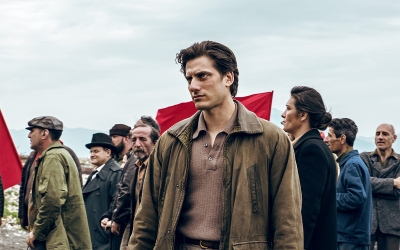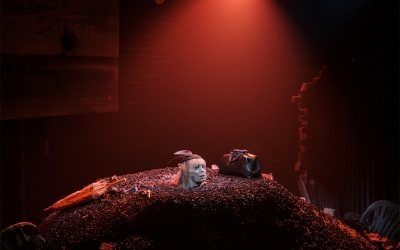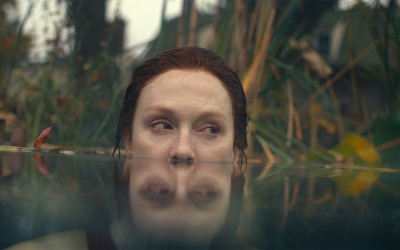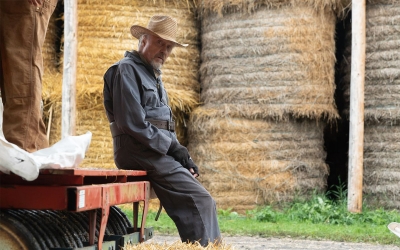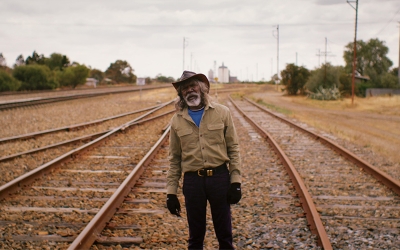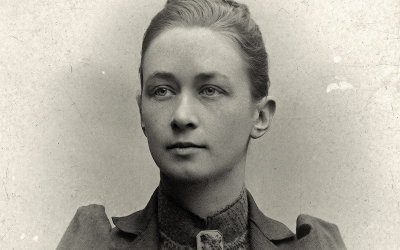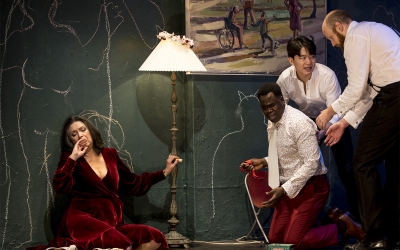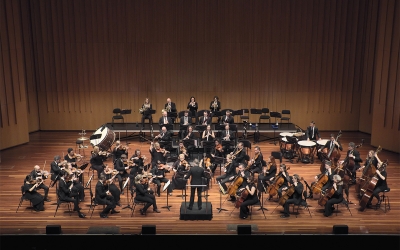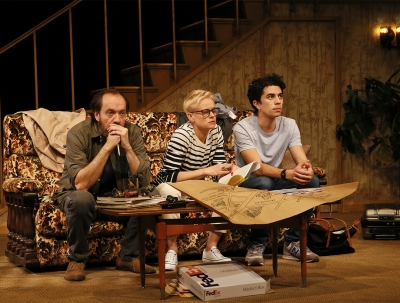Arts
Film | Theatre | Art | Opera | Music | Television | Festivals
Welcome to ABR Arts, home to some of Australia's best arts journalism. We review film, theatre, opera, music, television, art exhibitions – and more. To read ABR Arts articles in full, subscribe to ABR or take out an ABR Arts subscription. Both packages give full access to our arts reviews the moment they are published online and to our extensive arts archive.
Meanwhile, the ABR Arts e-newsletter, published every second Tuesday, will keep you up-to-date as to our recent arts reviews.
Recent reviews
‘I want to tell you about my incessant march through the kingdom of knowledge.’ Hands in pockets, jacket collar turned up against the wind, Martin Eden (Luca Marinelli) strides forward, centre-frame. He cuts a bold, broad-shouldered figure against a steely Rothko of a backdrop, all cool blues, hazily banded into sky, sea, and deserted concrete waterfront. But for his lilting napoletano voiceover, and the chanson strains of Joe Dassin’s 1970s hit ‘Salut’ – addressed, like Martin’s words, to a lover who’s far away in more senses than one – he seems like a man out of space and time.
... (read more)Towards the end of the first act of Happy Days, Samuel Beckett spells out clearly the question that is at the heart of his work and that of the playwrights loosely grouped under the title ‘absurdist’. His protagonist, Winnie, buried up to her waist in earth, is describing the conversation of a couple who, wandering by, have caught sight of her. The man turns to his female companion. ‘What’s she doing? he says – What’s the idea? he says – stuck up to her diddies in the bleeding ground – coarse fellow – What does it mean? he says – What’s it meant to mean? … Do you hear me? he says – I do, she says, God help me … And you, she says, what’s the idea of you, what are you meant to mean?’
... (read more)The fiction of Stephen King has always been ripe for a retelling – rich yarns recycled from iteration to iteration, enduring beyond their original prose. The occupied bathtub of Room 237, the soporific taunts of a clown in a gutter, the oily habits of undead feline – all are as cryptic and terrifying in ink as they are on film. Based on King’s 2006 novel of the same name, this eight-episode Apple TV mini-series adaptation, with King himself as scriptwriter, is the most recent such retelling. It is lush with ideas: a dream world, Boo’ya Moon, where an ochre sun hangs low at permanent dusk; a neologism, ‘bool’, which can mean all manner of things, light and dark; and a new protagonist, Lisey (Julianne Moore), widow of writer Scott Landon (Clive Owen), who journeys through long, endless hallways of memory, lost in a melancholic swirl of grief and trauma.
... (read more)Percy vs Goliath, known simply as Percy in some territories, is based on a real-life legal case of an independent crop farmer who took on a large-scale agrochemical corporation. One can imagine a shared sentiment that the story would make a great Hollywood movie. Problematically, the reason for thinking this is because Hollywood has made this film before, repeatedly. The familiarity and predictability of the events depicted are the very reason why it shouldn’t be made into a film.
... (read more)In 1955, Charles Chauvel’s Jedda – the first colour feature film made in Australia – was released. At the January première in Darwin, the two Aboriginal cast members, Rosalie Kunoth-Monks and Robert Tudawali, were the only ones permitted to sit with the white people. (Later that year it was released in the United Kingdom as Jedda the Uncivilized.)
... (read more)Ever since experiencing my first séance at the Victorian Spiritualist Union in the mid-1960s, when I made contact with my godmother and uncle, I have been fascinated by the supernatural. Over the years, I have visited fortune-tellers, astrologists, clairvoyants, and others claiming to have psychic powers. For the most part, these have proved a lot of generalised mumbo jumbo, but a few claims have been remarkably accurate. In 1989, I was amazed when a London clairvoyant told me she had a message from Father: ‘I’m sorry for the way I treated your mother and left the family, but now she’s married to another very difficult man.’ How could she have invented this?
... (read more)What did Anton Pavlovich Chekhov ever do to Sydney theatre that Sydney theatre should treat him as it does? Since Tamas Ascher’s superb STC production of Uncle Vanya hit the stage in 2010, Sydney has been subjected to performances of The Seagull, Ivanov, The Present (aka Platonov), and Three Sisters that, in their attempts to be ‘relevant’, have ridden roughshod over the subtle, devastatingly acute dissections of humanity with which Chekhov presents us.
... (read more)‘Bringing the world back home’ was an early strapline of Australia’s SBS network. In those early multicultural days, it emphasised that being Australian did not restrict you from being culturally plural. It had the unfortunate implication, however, that Australia was not actually part of ‘the world’. We stood apart. Zoom forward to Covid-struck 2021, and Australia desperately wants to stand apart. Bringing that world back home has proven quite a technical difficulty, in sport, business, culture, even family reunion.
... (read more)As the third Verdi opera on offer in Melbourne this season (along with Opera Australia’s Aida and Ernani), Melbourne Opera’s production of Verdi’s Macbeth at Her Majesty’s Theatre is a mixed offering. Verdi wrote Macbeth – one of his earliest operas and less celebrated than his later Shakespearean works, Otello (1887) and Falstaff (1893) – when he was thirty-three; it had its première in Florence in 1847. Both musically and dramatically, it is clearly rooted in the bel canto era, which prioritised beautiful singing above all else. In 1865, Verdi revised the opera for the Paris Opera. Usually, one version or the other is performed; however, this performance saw an amalgamation of the two. This creation of a new version of Verdi’s work might be considered either innovative or musicologically messy. Regardless, it further complicates the relationship between source work and adaptation that is, for better or worse, always at play in Shakespeare-based opera.
... (read more)Over the past decade or so, the centrality of fact in journalism, in political discourse, and in long-form non-fiction writing itself has taken a hit. The days are long gone when readers of The Washington Post could have confidence that the journalists who broke open Watergate had not only done due diligence but had chased every fact down the rabbit hole of governmental corruption. Now readers tend to gravitate to media organisations that confirm their own bias and dismiss the others as hubs of half-truths and outright lies. But what if the facts obscured rather than revealed the heart of a story? What if the facts got in the way of the mood, the texture, and the feeling of a real-life event? Is there any justification for deliberate or poetic inaccuracy in non-fiction? Lifespan of a Fact, a new play currently being presented by the Melbourne Theatre Company, has us wondering.
... (read more)
